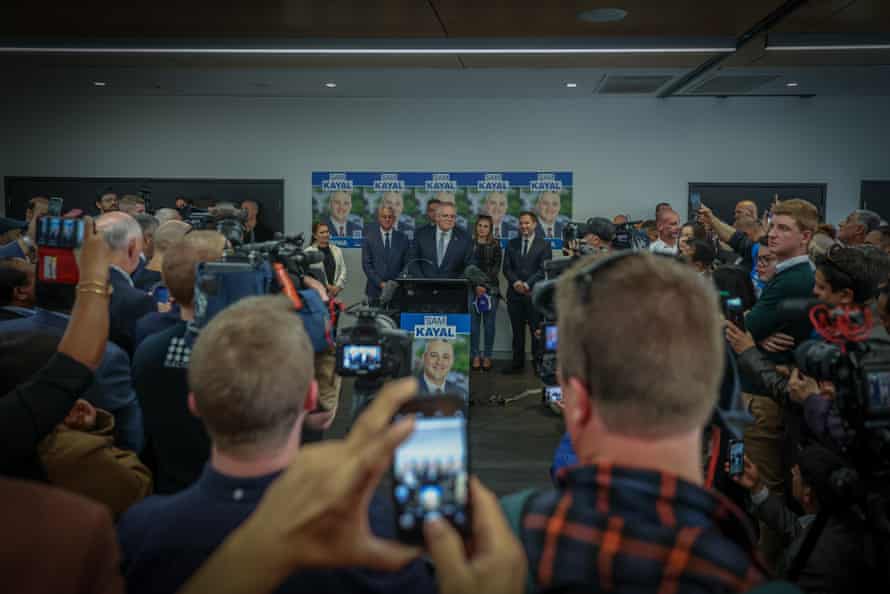Elias Visontay
The Australian Electoral Commission has conceded that the roughly 200,000 Australians who have tested positive for Covid in recent days and will be in isolation on polling day this Saturday risk not having their votes counted this election.
In anticipation of Australia’s first federal election since the outbreak of the pandemic, a special Covid provision was written into the Electoral Act which gives anyone who tested positive after 6pm on Tuesday eligibility for telephone voting, a method previously used by voters with vision disabilities.
Anyone who tested positive since Saturday – about 200,000 people according to state and territory health departments – will be in their seven day isolation period on election day this Saturday.
People who did not apply for a postal vote before the Wed 6pm application deadline, haven’t voted yet, tested positive before 6pm Tues, and are in isolation through to after election day, may not be able to vote.
— AEC ✏️ (@AusElectoralCom) May 19, 2022
For those who tested positive after Saturday and before 6pm on Tuesday, postal voting is the only option available for voting, provided they did not vote at a pre-poll centre before entering isolation.
However, applications for postal voting closed at 6pm on Wednesday, meaning those only eligible for postal voting, who did not register before the deadline – some of whom had just 24 hours to do so – cannot cast their vote by post.
The AEC has acknowledged that some in this cohort “may not be able to vote”. A spokeswoman told Guardian Australia there is no scope to change the voting eligibility rules because they are set out in legislation. “We cannot change this,” the spokeswoman said.
Even those who applied for a postal vote before the registration deadline are not guaranteed to receive their ballots before Saturday, meaning they cannot be counted.
The AEC spokeswoman said:
We will be doing everything we can to ensure people who applied for a postal vote will receive them.
Frydenberg and Birmingham are defending spending on community projects, following a Sydney Morning Herald report that some might be unconstitutional.
There’s a “long-established legal framework”, Birmingham says.
Q: In the scheme of things, what does $7.4bn matter?
Birmingham says the Coalition’s spending was “temporary and proportionate” and that emergency spending was removed, which improved the budget bottom line. He says:
We’ve done the hard yards to show a reduction in government deficits to the tune of $104bn, Labor wants to add $7.4bn in extra spending.
He says Australians are conscious of inflationary pressures, and the higher deficit would add to inflation, risking higher interest rates.
I’m sure you’ve heard all this before – Frydenberg says there are lower taxes under the Coalition, the defence spending fell under Labor, etc., so on, ad nauseum. We’re at the point in this campaign where people hope repetitive statements will drill their way into the brains of undecided voters.
Q: What do you say to Australians who are doing it tough?
Frydenberg says the government is “very conscious” of cost of living pressures, and points to the (temporary) halving of the fuel excise, the (temporary) extension of the low and middle income tax offset, the (one-off) payment to pensioners, and the reduction in medicine prices.
On wages, he points to a statement from the Reserve Bank that about 40% of the employers surveyed are providing wage increases of at least 3% (inflation is at 5.1%). The wage price index this week showed a 0.7% increase, Frydenberg says, but look at all these overseas countries where it’s worse.
Frydenberg says the jobs that have been created are full-time jobs … with some part-time jobs lost from the economy. “We have a very strong story to tell about the participation rate,” he says, adding that youth unemployment and female unemployment is down:
Of those 1.9 million more Australians in work … 1.1 million of those are women and 70% of those jobs have been full-time.
He’s harking back to the start of the pandemic and the fears then that unemployment could reach 15%. “This is not a good result, this is an extraordinary result,” he says.
“The choice as this election is becoming clearer and clearer,” Birmingham says, before repeating Frydenberg’s criticisms of Labor leader Anthony Albanese.
Birmingham says the costings document is “flimsy”, and “released with just one day until polling day”. He says not a “single policy” has been submitted to the Parliamentary Budget Office.
He’s running through a list of Labor promises, and says the amounts in the costings documents are lower – that’s why the $7.4bn deficit is “just the beginning”, he says.
The Coalition is committed to creating 1.3m new jobs and 400,000 new small businesses over the next five years, Frydenberg says. He says Labor’s costings are a “farce”, without independent verification (I’ll check on this later), and then we’re into the “this election is a choice” talking point.
Frydenberg is now handing over to Birmingham to talk about Labor’s costings.
Frydenberg is speaking now. He says nearly 2m more Australians are in work today “than when we came to government”. He says:
And it’s not the numbers that count, it’s the people behind the number. It’s a Mum, or a Dad, or a brother or a sister, a son or daughter who now have the dignity of work and the ability to provide for their families.
He says Australia’s economic recovery has outpaced the other developed nations’. The truth is it’s a little more complicated than that, as Paul Karp explained.

Paul Karp
Prime minister Scott Morrison has addressed the multicultural afternoon tea in Werriwa.
He said:
Around half the population either was born overseas or one of their parents were. There’s two things they come for: that economic opportunity, knowing they can have a job or afford to run a business.
Migrant communities have a much higher rate of running their own business, there’s that entrepreneurial spirit, that work ethic. I’ve always said if you have a go you should get a go. I think that’s demonstrated more than anywhere else in multicultural communities. Today unemployment has fallen to 3.9%. I know that our economic plan is working.
He went on to say:
The other thing that they come for, as their kids grow up, what they really want to see is them owning their own home. It provides the foundation for that most important thing, and that is family. The responsibility, love and care of family. Strong relationships, strong marriages.
Owning a home is the biggest investment you’ve ever made, the biggest asset you’ll ever own, the biggest decision you’ll ever take … what we want to do is ensure that people can get access to their own money in their own superannuation.

Morrison argued that Labor doesn’t “trust” Australians with their own super. He said they wanted you to leave it in super “for union bosses to decide what shares you buy” – which got a little exclamation of “shame!” from the audience, who are those entrepreneurial small business people Morrison mentioned and a good few young Liberals – neither with much regard for unions.
Morrison disparages the Labor leader, Anthony Albanese, for supporting the Western Sydney Airport through the late 90s and noughties but failing to get it built. That also draws another little cheer of “shame”. There was also a cheer of “vote for Sam (Kayal)” – not sure any of these folks are undecided.
Morrison also urged attendees to put the pandemic behind them:
Governments telling us where we can go, what we can do – we’ve had enough of that. We can put that safely behind us, because we’ve been able to demonstrate we can protect our public hospitals. We can look forward to the future in confidence.
We’ll hear from treasurer Josh Frydenberg and finance minister Simon Birmingham shortly, as economic debate dominates these last days (hours?) of the election campaign.

